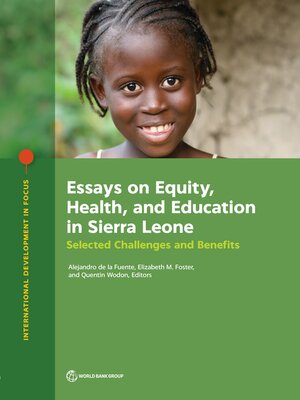Essays on Equity, Health, and Education in Sierra Leone
ebook ∣ Selected Challenges and Benefits · International Development in Focus
By Alejandro de la Fuente

Sign up to save your library
With an OverDrive account, you can save your favorite libraries for at-a-glance information about availability. Find out more about OverDrive accounts.
Find this title in Libby, the library reading app by OverDrive.



Search for a digital library with this title
Title found at these libraries:
| Library Name | Distance |
|---|---|
| Loading... |
Sierra Leone is one of the poorest countries in Sub-Saharan Africa, with a gross national income per capita of USD510 in 2022. The country ranked near the bottom of all countries in the latest Human Development Index. Despite these low rankings, in the years since the end of the 10-year civil war in 2002, Sierra Leone has made notable progress. The return to peace and stability and the ample availability of fertile land have facilitated recovery and growth in agriculture. Urban areas have become local trading and commercial centers, and the capital of Freetown has seen many sources of new wealth and development. Poverty significantly declined from 2003 to 2011. Progress continued, although less emphatically, until 2018, and access to basic services improved, particularly in education and health. Sierra Leone has made strides in key indicators on education and health, including expected years of schooling and primary completion rates. Strong gains in reducing under-five and maternal mortality as well as under-five stunting have also been observed. However, improvements in some of these dimensions should not distract policy makers from the challenges posed by the relative lack of progress in others. Adolescent girls in Sierra Leone continue to have relatively high rates of child marriage and early childbearing and low educational attainment. Moreover, improvements have not permeated to the entire population. The rural poor population in particular has experienced a relative lack of progress. Essays on Equity, Health, and Education in Sierra Leone: Selected Challenges and Benefits examines the evolution of poverty and human development outcomes since the end of the civil war and asks if the foundations for achieving shared prosperity and addressing persistent poverty in the country have been laid down through key policies in the education and health sectors.







